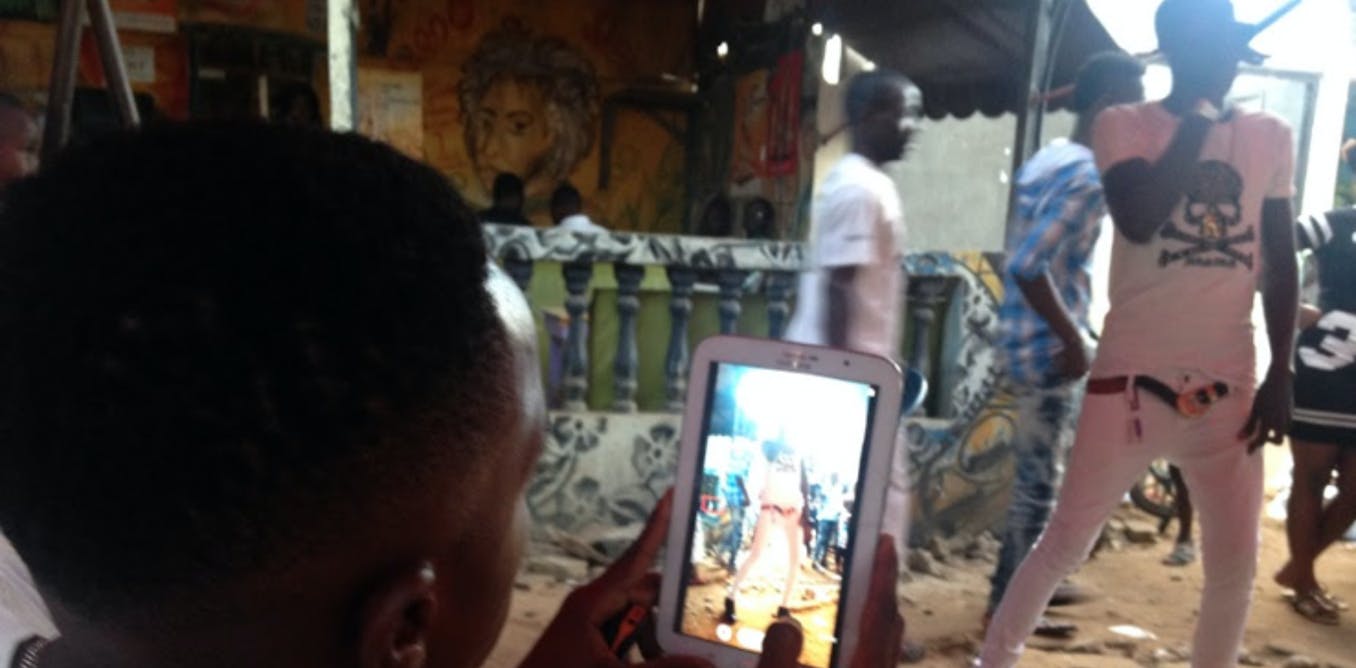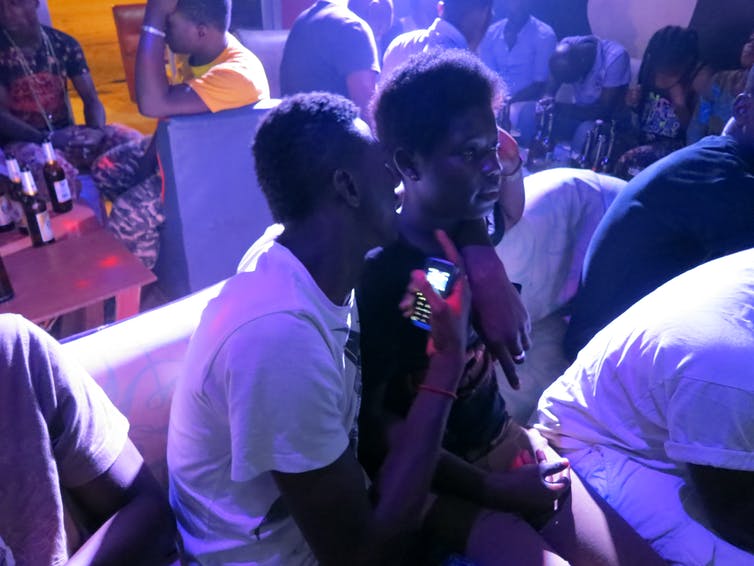How Ivorian cyber-scammers help us to understand the magic of the internet

In Côte d'Ivoire, brouteurs are known for chasing a life of fame and fortune. Alexander Newell
Societies that identify as “modern” tend to categorise people who believe in an invisible world of magic and spirits as irrational and superstitious, thereby excluding them from modernity. But have they ever considered the invisible forces of the digital world might not be that far away from those of witchcraft?
Overlapping worlds
African studies have long wrestled with how to represent the phenomena of witchcraft, magic and spirits in cultural life across Africa. Scholars fear that writing about these topics encourages stereotypes about African superstition, yet many recognise the occult is an unavoidable part of the lives of those about whom they are writing.
At the same time, in the global North and almost everywhere else in the world, over the last 20 years our lives have been invaded by invisible agents of which most of us have very little understanding, agents that follow us everywhere, record our every preference and purchase, our personal exchanges with others, our very footsteps. I’m talking about our smartphones.
An extract from Vivre Riche (“To live rich”), a documentary by Joël Akafou about brouteurs.
I was taught to see the Internet this way in Abidjan, Côte d’Ivoire, where my research into cybercrime and sorcery made me believe we can use the virtual worlds of sorcery to understand the virtual worlds of the Internet. Because we all share experiences of the Internet, this comparison may also help readers imagine what it feels like to live in a world where witchcraft and magic are part of everyday experience.
The art of masquerade: life as a brouteur in Côte d’Ivoire
Brouteurs, or “cyber-scammers” in local slang, are seen as Robin Hood figures who take from the global rich to give to the people, eventually reaping the benefits of celebrity and a luxurious lifestyle. They operate by building social media avatars that surf the web in search of romantic relations with comparatively wealthy residents of the global North. When they find a mougou (victim), they build a relationship of intimacy and trust using their fake digital persona, deploying deft cultural performances and seductive craft to manipulate the mind of their target. Though most brouteurs are young African men, they present themselves most often as white women, crossing both racial and gender lines in their performances.
The goal is to eventually get the mougou to open his or her wallets, not once, but as many times as can plausibly be requested. Here, brouteurs will typically resort to stories involving gender and race stereotypes: abusive parents, misadventures while on business or tourist ventures in Africa, lost passports, cancelled flights, corrupt police officers, and life-threatening illness are common tales of the trade.

Ivorians gather at a fête des brouteurs.
Alexander Newell
Lured by the lucrative prospects of the trade, most brouteurs will tap into a new form of sorcery called zamou that aims to influence people across the Internet. This might involve a number of spells, such as attaching amulets to their computers or phones in the hope of enhancing their power.
Witnessing the brouteurs’ lavish spending, fast cars and conspicuous drinking, Ivorians often question their morality. There are rumours that they will go to any lengths to get rich through the Internet, including engaging in human sacrifice, forming pacts with spirits to sacrifice their fertility, or even trading future years of their own life for a present filled with fame and fortune. For their critics, this explains the many deadly car crashes involving brouteurs, whose lives end abruptly when they must settle their dues to the genies whom they have dealt with.
Second dimensions
As in many parts of Africa, the invisible realm of witchcraft and magic is conceived as a second world that overlaps with visible reality. All creatures and things have a double in that world – a second version of themselves that is linked to their everyday material body.
When someone attacks another person through occult means, they pass into the second invisible world and target their double there. Not long afterwards, terrible things will happen to the victim’s real body: a car crash, a building collapse, or illness. Thus, inexplicable misfortune is understood to be the result of actions in this shared virtual space, actions visible only to those with “a second pair of eyes” to see in that world. In talking to Ivorians about Internet scammers and their digital sorcery, I realised there were strong similarities between the technological capacities of digital worlds and the occult possibilities in the second world. Indeed, for Ivorians, these spheres often overlap.
The anthropologists Neil Whitehead and Sverker Finnström have similarly argued contemporary warfare that relies on virtual representations to kill one’s enemies (for example, piloted drones, cyber-warfare, night vision or satellite surveillance) perfectly resonates with the already existing imagination of witchcraft and magic as virtual spaces through which one can attack and kill others invisibly.

Brouteurs are perhaps cannier than most Westerners in their recognition of the magical forces that shape the Internet.
Alexander Newell
The Internet is also riven with invisible forces through which capitalist entrepreneurs and criminals alike drain our income and gather our data, often without our awareness. Gossip and “fake news” that circulate through viral pathways of social networks play an important role in determining the moral and political shape of our world, helping to elect presidents, undermine election results and destroy reputations overnight. Just as a placebo can heal when presented as true medicine, it is possible to kill through symbols by convincing someone they will die.
Recognising the magic of the Internet: from e-mails to data surveillance
Last but not least, digital technologies can drastically shake our trust in social relations around us, be they shifting avatars, e-mails masquerading as official bank communications, or advertisements customised to respond to our movements in physical and digital space. Is it any wonder such a world – where rumour and news co-exist on the same media platforms – sees us believe that Satanic US politicians could be trafficking children, or that in Côte d’Ivoire, close family members might secretly be witches selling their own kin’s bodies for profit?
Ivorians engage with both forms of the virtual at once, and it is no wonder that they see the Internet as full of nefarious and often inhuman agents with unseen powers to enrich, impoverish, create and destroy. Brouteurs employ digital sorcery, literally and figuratively, to enrich themselves and, as they put it, take back the “colonial debt” they are owed by “the West.”
Understanding these Ivorian digital performances as potent magic helps to see these tales of the occult as insightful theories rather than irrational superstition. Indeed, most of us engage the magic of Internet with very little technical understanding of the forces that make it possible, nor the dangerous enchantment it has wrought, entangling the very pathways of intimacy with data surveillance, private profit, and openings for the dark arts of digital sorcery.

Alexander Newell a reçu des financements du F.R.S.-FNRS, Actions de Recherches Concertées ULB, Mellon Fellowship, et la Fondation Wenner Gren.







